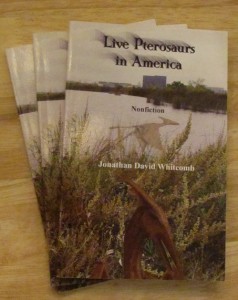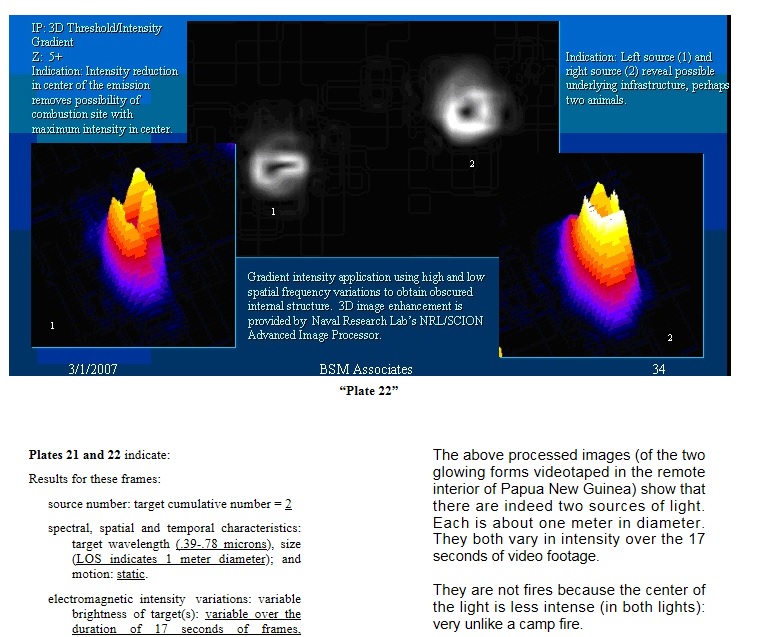The following is how I replied to an email I got from a man I’ll call “KDM.” I suspect that he has been influenced by a particular biology professor (who teaches at a university in Minnesota) who recently wrote a post about why people should give no credence to my writings. That post is titled “There are no living pterosaurs, and ‘ropen’ is a stupid fantasy.” I will not here repeat what that biology professor said about what I do with “turds.” I am now more concerned about KDM. I hope that he sincerely wants to know the truth.
KDM asked if I was Jonathan Whitcomb. He was apparently responding through the message system of a blog in which I use a pen name. (I have recently learned of problems that can be caused by using a pseudonym online, and I’ve added my real name to those posts, to avoid those problems.) He then asked if I had reviewed my own book under a “fake name,” and if I had any physical evidence that a pterosaur still exists. Here’s my reply:
Thank you for your questions.
I’ll answer your last question first, but I feel it needs to be taken in context: There is no physical evidence for the universal extinction of all pterosaurs. In addition, there is no eyewitness evidence for their complete extinction. In other words, there is NO EVIDENCE, of any kind, that all species of pterosaurs became extinct.
For modern living pterosaurs, however, we have BOTH physical evidence and eyewitness evidence. The difficulty some persons have with it, however, is that reported eyewitness encounters with living pterosaurs dominate the physical evidence, in both quantity and quality. So if you quickly scan a few sentences on one or two web pages, on modern pterosaurs, you’ll see only one or two sighting accounts, probably eyewitness evidence, not physical. And if you find a page on the video footage obtained by Paul Nation (two flying lights in Papua New Guinea), it will seem indirect and of little import, unless you have already studied the best eyewitness sighting accounts of those who have seen a large glowing flying creature.
Also remember that we’re still in the realm of cryptozoology here. Some skeptics inadvertently compare cryptozoology with biology, assuming they can show that the living-pterosaur investigations are worthless. That is not the case. They may unknowingly prove that cryptozoology is not a branch of biology, but who doubts that? What use is it for skeptics to prove what practically everybody already knows?
Another problems arises here. We do not yet have any photo or video of the form or features of a modern pterosaur WHILE it’s accompanied by sufficient eyewitness credibility from a report by one who was there during the photographing or videotaping, at least sufficient that my associates and I feel strongly enough to emphasize it. Be aware that I am writing this on August 25, 2014, and my associates and I have been working, for years, on obtaining better photos and videos (or encouraging others who might obtain them), and we hope that somebody will soon be successful in getting that better-quality physical evidence.
Example of Physical Evidence
Paul Nation, from Texas, videotaped two lights on a mountain ridge, deep in the interior of Papua New Guinea, late in 2006. The video footage he brought back to the United States is indeed physical evidence. Before dismissing that evidence, beware or at least be aware of the kind of skepticism that may be inappropriately used here.
Scientific skepticism differs from dogmatic skepticism. I won’t go into details here. Briefly, the non-scientific form can be seen in this example:
When astronomers were photographing star positions, early in the 20th century, to test one of Einstein’s theories of relativity, many people may have been suspicious of a new idea that they could not understand. Isaac Newton’s concepts appeared fine to many non-scientists, so why give credence to ideas that were so weird? To reject the work of multiple astronomers, however, would be dogmatic skepticism, notwithstanding the long-standing popularity of the older ideas from Newton. The number of scientists who had assumed, over many generations, that Newton was correct about gravity—that DOES NOT DISPROVE the ideas of Einstein, neither before nor after the early-20th-century astronomical observations.
In addition, we cannot reasonably dismiss all of Newton’s scientific and mathematical work, simply because of his active Biblical studies and his deep faith in the Bible.
Physical Evidence Analyzed
(Getting back to research on the nocturnal flying creatures) Clifford Paiva, a missile defense physicist, analyzed the video footage recorded by Paul Nation. Part of his final report can be found here: Pterosaur Sightings in Papua New Guinea. This is physical evidence, analyzed scientifically by an educated scientist, with the assistance of Harold S. Slusher, Professor, Physics Department, University of Texas at El Paso.
Part of one page of the condensed version of Cliff Paiva’s report on living pterosaurs in PNG
.
Jonathan David Whitcomb on the tropical island of Umboi
Pen Names
Thank you for helping bring to my attention a legal and ethical issue with the use of pen names on the internet. Your question about a “fake name” caused me to look into this matter of using a pen name in online publications. I recently added my real name to those blog posts that had been under a pseudonym, to avoid any future misunderstanding. I had no intention to deceive anybody. The following may help clarify my purposes in using those names.
On the subject of modern pterosaurs, I have written posts in over 30 blogs over the past 11 years. In 13 of those blogs I contributed 1075 posts. That was in addition to hundreds of other web pages (non-blog). In the great majority of those blogs, I have used my regular name: Jonathan Whitcomb (or “Jon Whitcomb” or with my middle initial or “David”). On at least two of the blogs, I have used a pen name, also known as a pseudonym. There may have been one more blog in which I used a pen name, but those were the exceptions. The two names are Norman Huntington and Nathaniel Coleman. During those limited years in which I used a pen name, most of my posts were under my regular name.
One Purpose of Jonathan Whitcomb
Why did I use those two pseudonyms? Soon after my 2004 expedition in Papua New Guinea, I noticed some web pages and forum postings that ridiculed me for believing in the possibility of modern pterosaurs. One of the first ridiculing critics proclaimed that I had led a group of creationists on an expedition in Africa, following the directions of one or more other creationists. But those readers who would look deeper into that statement would have noticed problems, including the misspelling of both my first and last name. In reality, I had never set foot anywhere in Africa and had never been sponsored by anybody, creationist or not (except for one skeptic who sent me a contribution of about $5 or $10 to help defray the thousands of dollars of my own money for my expedition in 2004). Also, I had not led any creationists on any expedition, unless you count a few natives on Umboi Island (men who were members of the local Baptist Church, but that would be stretching the word “creationist”).
The Africa-expedition critic called me a kook whom even other kooks consider a kook, I guess meaning that I am a super-kook. That paragraph, under the heading of “Ropen Hoax,” can still be found on the evolutionwiki-dot-org page “List of Dragon/Dinosaur Fabrications . . .” as recently as August 26, 2014, at 4:15 a.m., Mountain time.
It got so bad that one skeptic wrote that people should be cautious about the reports of expeditions by the American explorer Paul Nation because he was associated with “Jonathan Whitcomb” (spelling my name correctly). In other words, he insinuated that maybe people should doubt the words of any person who is associated with Jonathan Whitcomb.
The most consistent barrage of insults and accusations, however, appeared to come from a few vocal skeptics on cryptozoology.com. It may have been around that time: I decided to use pen names, so that readers who had been influenced by crude, insulting, and even libelous comments about me would be able to consider the ideas rather than immediately reject them.
So what about honesty? I was trying to bring the truth to whomever would pay attention. I was not the lone cryptozoologist, writing under other names to give the impression that several cryptozoologists were involved. Indeed, some of the Americans who had searched for living pterosaurs in Papua New Guinea do not even want their names mentioned. (Others include Paul Nation, David Woetzel, and Garth Guessman.)
As recently as August of 2014, a professor in Minnesota wrote a post ridiculing my work, implying, perhaps, that all the writings online (about modern pterosaurs) were written by me, Jonathan Whitcomb. He said nothing about any scientific papers on the subject, even though David Woetzel and I have written separate papers in a peer-reviewed journal of science. In addition, the writings of Woetzel and Guessman can be found online, if one looks for them, and others have written in support of the possibility of modern pterosaurs.
That professor in Minnesota would have been correct if he had stated that most of the more visible blog posts and web pages were written by me. But it seems he was bent on proclaiming what would discredit me, apparently assuming the worst for my motivations. He would have done much better avoiding bulverism.
Connotations of Different Words
Please be aware of the connotation of “fake name” or “alias,” which are used for criminals who are trying to avoid being caught by police. The following words are normally used differently:
- pen name
- pseudonym
- stage name
- nom de plume
The above four usually carry no connotation of any connection with any crime. In fact, a number of legitimate concerns can lead to a writer or an actor to use a pen name, without the need for anyone to suspect dishonesty. Regarding the concept of sockpuppet, I’ll comment a bit later.
Honesty in Using a Pen Name
By the way, I have published the response you are now reading. It’s here: [URL of this blog post] I used an invented name for you (“KDM”), since you did not give me permission to use your real name. That’s another legitimate reason to use a different name.
You ask if I had reviewed my own book under a “fake name.” Have you seen “Book About Ropens” that was published June 18, 2014? The first thing I recommend looking at is the advertisement at the bottom of the page, which includes, “Treat yourself to an extraordinary true-life adventure,” with the word “advertisement” above the photo of a stack of books. If that praise for the book had been in the main part of the post itself, it could be questionable, for it might leave an impression that I was a purchaser of the book and was praising it. But that statement with “extraordinary” is only under the word “advertisement.” Notice also that “perfect gift” is only found in the advertisement.
Now look at the post itself, beginning with the first paragraph, which is mostly this:
“This book says very little about ‘finding God,’ but boy it says a lot about ‘searching for ropens.’ It’s 354 pages long, yes that’s a long book. Don’t bother even opening it, if you get your hands on a copy, unless you want to spend a lot of time reading. Once you get started, it’s really hard to put it down, and I’m just passing along what other people have said about this third edition and previous editions. . . .” In other words, I did not say that I personally found it hard to put the book down, for I was using a pen name, and it could have been misleading for me to have worded it that way, making it appear like I was a regular reader. Note the actual wording of what I actually wrote: “I’m just passing along what other people have said . . .”
By the way, “it’s really hard to put it down” comes from a reader review on Amazon, for an earlier edition of that book (Searching for Ropens), and I am not that reader. A dishonest user of a pen name would not bother with such a formality of writing: “I’m just passing along . . .”
If anything in this post seems to give the impression that I was trying to deceive anybody then I made a mistake in the wording, for I had no desire to lie, but to inform. Am I overreacting? Remember that much of this is responding to the words of a professor in Minnesota, who insinuated that I had been dishonestly using other names than “Jonathan Whitcomb.” The proclamation of that professor, his attempts to discredit me and my ideas—that may be misleading many of his students and many others who read his blog post. His many errors need to be made known, for the sake of the truth.
Take this review in context. Consider the following blog post, published at the time under the name “Norman Huntington,” titled “Three Books by Independent Authors.” Notice these words: “I don’t claim complete objectiveness in evaluating these three publications . . .” It’s now no secret that I was the writer who compared those three books and that one of those books was written by me, Jonathan Whitcomb. So why did I bring up the possibility that I might not be completely objective in reviewing those three books. Simple: I was being honest.
 Post on Modern Pterosaur, originally only under “Norman Huntington”
Post on Modern Pterosaur, originally only under “Norman Huntington”
.

Closeup of a paragraph of the blog post “Three Books by Independent Authors”
.
I was writing many blog posts about my latest book, Searching for Ropens and Finding God, with most of those under my regular name. Why should I write very differently using a pen name, or why should I say nothing about the book when I use a pen name? Look at all of the posts in which I used a pseudonym while mentioning one of my books, if you want to spend that much time searching online. In none of those reviews did I ever say that I had purchased a book or that I was a regular reader. The language, to the best of my memory, was always informative, not heaping praise as if from a delighted common reader. If any sentence appears otherwise, then I made an honest mistake.
It may look strange, to some, to notice that I wrote, “I’ll tell you what I like best about the title page,” but those are my exact feelings and thoughts. I have spent years perfecting my writing skills, and years writing the three editions of this nonfiction book (the third edition title “Searching for Ropens and Finding God”). I have always been writing for the approval of one person, in the artistic sense of quality English, and that person is me. Is it so shocking, then, that I continue to enjoy reading portions of my own book? I will not hide my own personal delight in a work that took years of my life. Why should I write differently about my books when I use a pen name? Regardless of all that, I no longer feel inclined to use any pseudonym in the future; it just leaves open too many opportunities for critics to accuse me of dishonesty.
Sockpuppet Writing
Wikipedia says (Aug 24, 2014): “A sockpuppet is an online identity used for purposes of deception.” That’s the first sentence on Wikipedia, and I believe it is the key to the definition.
How can anyone determine if deception was intended? We cannot read another person’s mind or that person’s intentions. But a clue we may discover in substituting the voice of the pen name for that of the regular name. That method cannot always prove whether or not a writer intended to deceive, but it can enlighten us regarding the degree of appropriateness or lack thereof. Note these theoretical examples, with a sockpuppet name of “John Jones” and the real name of “Senator Crabapple”:
From John Jones: “I have known Senator Crabapple for twenty years . . .”
The translation makes no sense: Senator Crabapple has known Senator Crabapple for twenty years.”
The above shows an obvious case of sockpuppetry. Compare it with the following:
(stated under another name) “Senator Crabapple has traveled across the state many times . . .”
Reasonable translation: “I have traveled across the state many times . . .” or “Senator Crabapple says that he has traveled across the state many times,” or “according to Senator Crabapple. . . .”
The above translations regarding travel in that state—they make sense, so that in itself is not sockpuppetry, meaning it could have been the honest use of a pen name.
Another Point on Pen Names
If no biology professor (or any other critic) had ever used words like “turds” or “lies” or “stupid” when referring to my writings, over the past 11 years, I would probably have had no reason to use a pen name. Let the words tell truth, whatever the name of the author.
###
“Poop” From a Biology Professor in Minnesota
If I were to respond, in one posting, to all his negative comments about my writings, my religion, and my personal motivations, it would be a long posting indeed. And it could reflect more negatively towards that professor than his posting did towards me.
The latest skeptic to join in criticizing online reports of ropens and other non-bat featherless flying creatures—that appears to be a biology professor in Minnesota, although I will not mention his name here. His blog post he titled “There are no living pterosaurs, and ‘ropen’ is a stupid fantasy.”
.
_____________________________________________________________________________

Paperback: Live Pterosaurs in America (3rd edition)
From the back cover:
Discover for yourself these amazing yet true stories and why they are usually absent from news headlines. Learn of the searches and research done by a few American cryptozoologists who stand up to ridicule and proclaim the truth.
Available from online book sellers like Amazon and Barnes & Noble.
Author: Jonathan David Whitcomb
ISBN-13: 978-1466292116
154 pages — 5.5 x 0.4 x 8.5 inches
.





